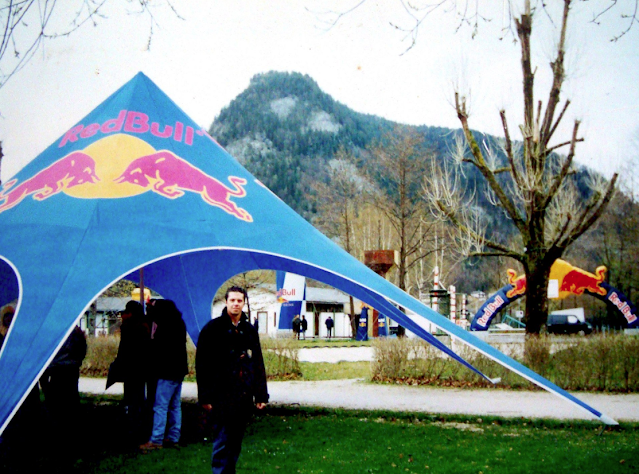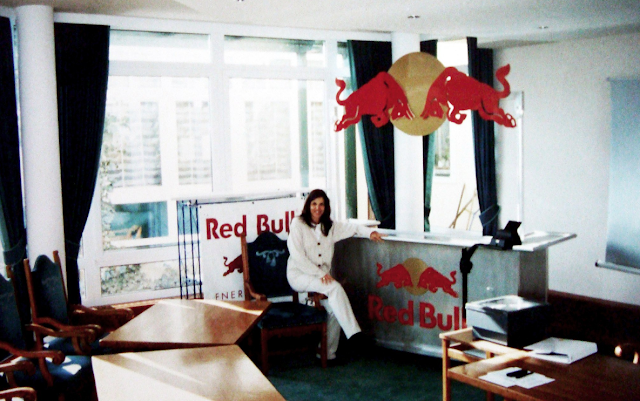 |
| Luiz Pagano at the Red Bull Global Headquarters in Fuschl am See, Austria - ft business prs |
Red Bull's branding was so well-crafted that it seems to have been created with the help of a crystal ball.
In the early days here in Brazil, I was part of the team responsible for the successful introduction of Red Bull into the market, serving as the first on-premise manager, overseeing establishments such as bars, clubs, and restaurants where beverages are acquired and consumed on-site. At that time, the energy drink market was already well-developed, with significant investments from brands like Flash Power, a company I had worked with from 1997 to 1999 as part of an outsourced team, and Flying Horse.
Facing intense competition, our challenge was to create an introduction strategy in the Brazilian market as creative and powerful as those developed in Austria for the brand's creation. At that time, Red Bull's distribution in Brazil was coordinated by the Madasa company, which held the distribution contract, while Red Bull itself managed marketing strategies.
 |
| One of the first Red Bull Vending Machines april, 1999 |
In April 1999, we traveled to Austria with a team of over 40 employees for marketing training.
Brazil was a highly valuable market, and the transmission of strategies could not afford deviations like those that occur in the "Chinese whispers" game.
Our goal was not only to introduce the brand but also to ensure a lasting competitive advantage in a highly competitive market. This mission demanded creativity, innovation, and a deep understanding of the local market, resulting in the solid establishment of Red Bull in Brazil, a trajectory that continues successfully to this day.
The creation and distribution of high-quality content are also key elements of Red Bull's marketing strategy, including press releases, formal news, customer stories, and later, with the advent of more sophisticated social media from 2000 to 2010, blogs and YouTube channels with thousands of videos, further strengthening the connection with its target audience.
Founded in 1987 in Austria, Red Bull quickly became the creator and leading company in the energy drink market, boosting the brand's value through brilliant marketing strategies, reaching an impressive global market share of 38% in 2020 (which was once over 80% in the early 2000s). The company adopted various tactics to achieve this success.
Red Bull's marketing strategy is multifaceted and begins with an inspiring and memorable slogan, "Red Bull gives you wings" (Red Bull verleiht Flügel), created in 1997 and maintained since then.
 |
| Encouraging the practice of extreme sports as part of the experience and team formation. Luiz Pagano and the Brazilian introduction team , April 1999. ft business prs |
In the late 1980s, surveys indicated that the image of the two bulls confronting each other in the logo was perceived as excessively intense. Faced with this perception, the brand's strategy evolved ingeniously, introducing a self-ironic character in animated advertising films. This character not only brought balance to the intensity of the previous image but also injected a dose of grace and humor, aligning more effectively with the audience's preferences and consolidating the brand's uniqueness. These creative strategies contributed to the brand's uniqueness, and despite facing some legal challenges throughout its history, the consistency in using this slogan strengthened the marketing strategy over time.
Furthermore, Red Bull heavily invested in extreme sports sponsorships, requiring courage, physical, and mental fitness - attributes of the brand. This culminated in the Stratos event in 2012, where Felix Baumgartner parachuted from the edge of space. These events not only broke world records but also boosted company sales.
The innovative and humorous advertising approach, initiated in 2000 with distinctive videos, solidified the brand's identity. Red Bull also excelled in using Guerrilla Marketing, such as the strategy of free drink distribution on university campuses.
Additionally, Red Bull built a strong and consistent brand around the slogan "Red Bull gives you wings," effectively directing its message to young men seeking adventures. The company utilizes word-of-mouth marketing, leveraging extreme sports events to reach millions of viewers and enhance the effectiveness of this form of advertising.
 |
| Red Bull Professional Training Center in Austria, April 1999 - ft business prs |
In summary, Red Bull adopted a comprehensive marketing strategy, combining quality content, extreme sports sponsorships, guerrilla marketing, innovative advertising approach, strong branding, and word-of-mouth marketing to achieve and maintain its dominant position in the energy drink market in Brazil and worldwide.






